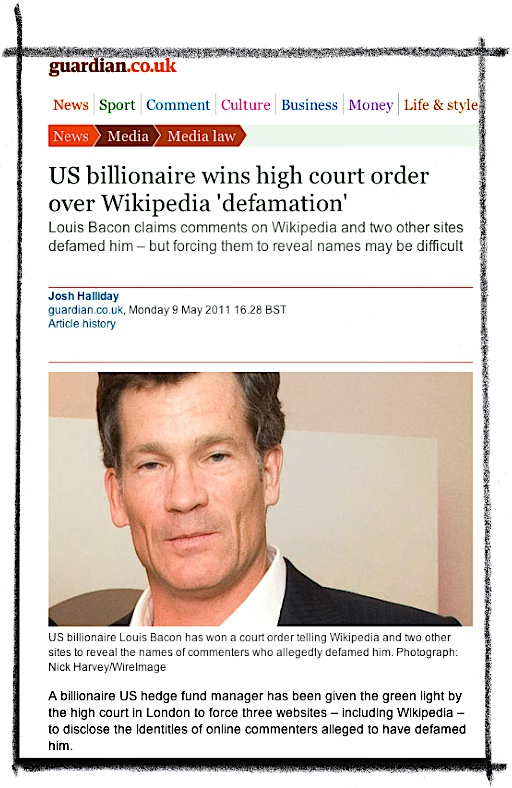Ooh err, anonymous comment trolls — here’s a development reported by The Guardian‘s Josh Halliday:
US billionaire wins high court order over Wikipedia ‘defamation’
… Louis Bacon, the founder and chief executive officer of Moore Capital Management, was given permission on Monday to use a UK court order to obtain the information from the US publishers behind Wikipedia, the Denver Post newspaper, and the popular blogging platform WordPress.
Bacon wants to launch defamation proceedings against a number of online commenters – all of whom use sobriquets like “gotbacon” and “TCasey82” – alleged to have posted libellous material about him on these websites….
Oops. Someone pissed off enough about what anonymous sockpuppets and trolls said about him online to pursue it. Whether or not Mr Bacon succeeds utlimately is of some interest. These revelations…
Automattic, the company behind WordPress, said Bacon would need a court order and that any defamatory material would be removed from its websites.
…the Wikimedia Foundation had told Bacon’s solicitors, Schillings, that it would hand over details of the commenters if it was served with a court order – but later said that it would have to be a US subpoena, as opposed to a NPO brought in a UK court.
…back up the sad tale JT Peterson recounted in his post ‘The Internet, Robin Hood, and his Merry Men‘ which in part told us:
One day Robin Hood and his Merry Men did something very bad and hurtful to Nottingham and cost Nottingham tens of millions of dollars. Damage in hand, Nottingham approached the Court of the land and received a cease and desist order and the right to subpoena, not just the data from the Merry Men’s computers, but also the very great internet servers of Yahoo and Google, which lay far beyond the borders of Sherwood Forest, but regardless, Nottingham got what he needed.
But, in my observation, more often than not, those threatening to seek and gain such court-sanctioned veil lifting and curtain parting do not, in fact, present their ‘damaged’ reputation to the judiciary to assess but rely on threats and intimidation against the medium of the comments. (They may have too many skeletons in the closet, or sometimes, the ‘allegations’ are close enough to accurate, and any commentary could be classed as fair opinion/free speech, or they can’t be bothered.) Unsurprisingly, the bluff and bluster works a lot of the time.
So, anonymous trolls and commenters, bear that in mind. If your whistle-blowing is genuinely exposing wrong-doing, and not just empty character assassination, it seems to me you needn’t fear this precedent. But if you’re just setting out to slime someone, just be aware lest your target/victim decide to unmask you — with my encouragement, as discussed in Potshots from behind a mask of anonymity are, by definition, cheap — if you really are crossing the line and making unsubstantiated allegations or worse, impersonating someone to play your little games.
I’m a fan of responsible robust commentary and whistle-blowing … but you gotta be careful what you say (or say it openly and damn the torpedoes, which tends to be my approach). See Anonymous comment vs IMPERSONATION.
– P





[…] I concede there are times when a pseudonym is a useful thing. But I just wish anonymous trolls wouldn’t be such dicks. See: Potshots from behind a mask of anonymity are, by definition, cheap and Hello anonymous commenters? […]